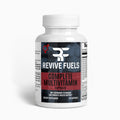When it comes to optimizing health and fitness through supplements, the choice between natural and synthetic options is a common dilemma. Both types of supplements have their pros and cons, but understanding the differences can help you make an informed decision about which is best for you. This article will explore the key distinctions, benefits, and potential drawbacks of natural and synthetic supplements to guide you toward the right choice.
1. Understanding the Difference
-
Natural Supplements: These supplements are derived from whole food sources or natural substances such as plants, herbs, and minerals. They undergo minimal processing to preserve their natural properties and are closer to the compounds found in food. Common examples include fish oil for Omega-3s, turmeric for inflammation, and ashwagandha for stress relief.
-
Synthetic Supplements: These are chemically created in laboratories to mimic the structure and function of natural nutrients. Synthetic supplements are designed to provide the same benefits as their natural counterparts but may differ in bioavailability and how they are processed by the body. Examples include synthetic Vitamin C (ascorbic acid) and folic acid, which are widely available in synthetic form.
2. Pros and Cons of Natural Supplements
Pros:
-
Better Absorption: Natural supplements are often more bioavailable, meaning they are absorbed and utilized more efficiently by the body. The presence of cofactors and enzymes in natural sources aids in absorption.
-
Lower Risk of Side Effects: Because they are closer to the natural nutrients found in food, natural supplements may pose fewer risks of adverse reactions or side effects.
-
Whole Food Benefits: Natural supplements often contain additional beneficial compounds like antioxidants, phytonutrients, and fiber, which provide broader health benefits beyond the target nutrient.
Cons:
-
Cost: Natural supplements tend to be more expensive due to the processes involved in extracting and preserving their ingredients.
-
Variability: Natural sources can vary in nutrient content based on factors like growing conditions, which can lead to inconsistencies in the amount of active ingredients.
-
Lower Potency: Natural supplements may contain lower concentrations of the active compound compared to synthetic versions, meaning higher doses or more frequent consumption may be necessary.
3. Pros and Cons of Synthetic Supplements
Pros:
-
Higher Potency: Synthetic supplements often contain higher concentrations of the active ingredient, allowing for smaller doses to achieve the same effect.
-
Cost-Effective: Synthetic supplements are usually less expensive to produce and, therefore, more affordable for consumers.
-
Consistency: Because they are lab-created, synthetic supplements can offer more precise and consistent dosing, which may appeal to those looking for exact control over their nutrient intake.
Cons:
-
Potential for Side Effects: Some synthetic supplements may not be processed by the body in the same way as their natural counterparts, which can lead to reduced absorption or unwanted side effects.
-
Isolated Nutrients: Unlike natural supplements, synthetic versions are often isolated to a single compound, meaning they lack the synergistic benefits of other nutrients and cofactors found in whole food sources.
-
Chemical Additives: Some synthetic supplements may contain artificial colors, preservatives, or fillers that can cause allergic reactions or digestive discomfort in sensitive individuals.
4. Which Is More Effective?
The effectiveness of natural versus synthetic supplements often comes down to the specific nutrient in question and the individual’s unique health needs. Here’s a look at some commonly used nutrients and how their natural and synthetic forms compare:
-
Vitamin C: Natural Vitamin C from sources like fruits contains bioflavonoids that enhance absorption, while synthetic Vitamin C (ascorbic acid) lacks these cofactors. However, both forms are effective in boosting immune health, with natural Vitamin C being preferred by those seeking added benefits from whole foods.
-
Omega-3 Fatty Acids: Fish oil, a natural source of Omega-3s, is rich in EPA and DHA, two fatty acids crucial for heart and brain health. Synthetic Omega-3 supplements, such as those made from algae, can be effective, but natural sources are often better absorbed.
-
Vitamin D: Synthetic Vitamin D2 (ergocalciferol) is less potent than the natural form, Vitamin D3 (cholecalciferol), which is derived from animal sources or synthesized from sunlight. D3 is more effective in raising and maintaining vitamin D levels in the body.
-
Folate vs. Folic Acid: Natural folate, found in leafy greens, is more readily used by the body than synthetic folic acid. However, many people can still benefit from synthetic folic acid, especially during pregnancy.
5. How to Choose the Right Supplements for You
When deciding between natural and synthetic supplements, consider the following factors:
-
Health Goals: If you are looking to fill a specific nutrient gap, such as increasing Vitamin D levels, synthetic versions may work well. However, for overall wellness and long-term health, natural supplements with broader benefits may be preferable.
-
Bioavailability: For nutrients like Omega-3s, where absorption is critical, choosing the more bioavailable natural form (fish oil) can offer better results.
-
Dietary Preferences: Vegans or vegetarians may prefer synthetic supplements for nutrients typically sourced from animal products, such as Vitamin D3 from non-animal sources or synthetic B12.
-
Allergies and Sensitivities: If you are sensitive to chemicals, dyes, or artificial additives, natural supplements may be the better choice to avoid reactions.
-
Budget: Synthetic supplements are often more affordable, so if cost is a factor, they may be the more accessible option.
Both natural and synthetic supplements have their benefits and potential drawbacks. Ultimately, the best choice depends on your individual health needs, goals, and lifestyle. Natural supplements offer whole-food benefits and better absorption, while synthetic supplements can be more potent, affordable, and consistent. Whatever you choose, it’s important to prioritize quality, choosing products from reputable brands that undergo third-party testing for purity and potency. Consulting with a healthcare professional can also ensure that you are selecting the right supplement for your specific health needs.




